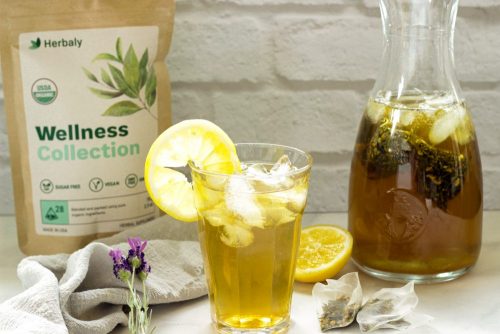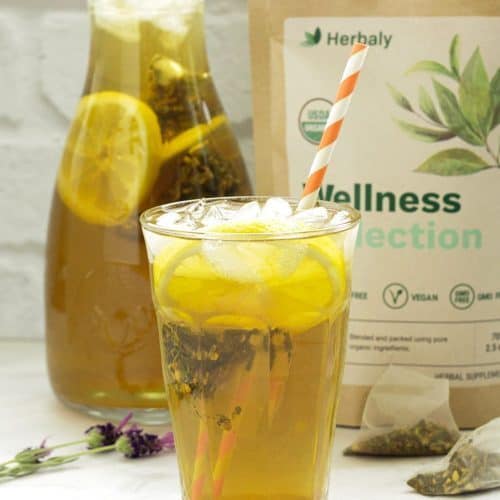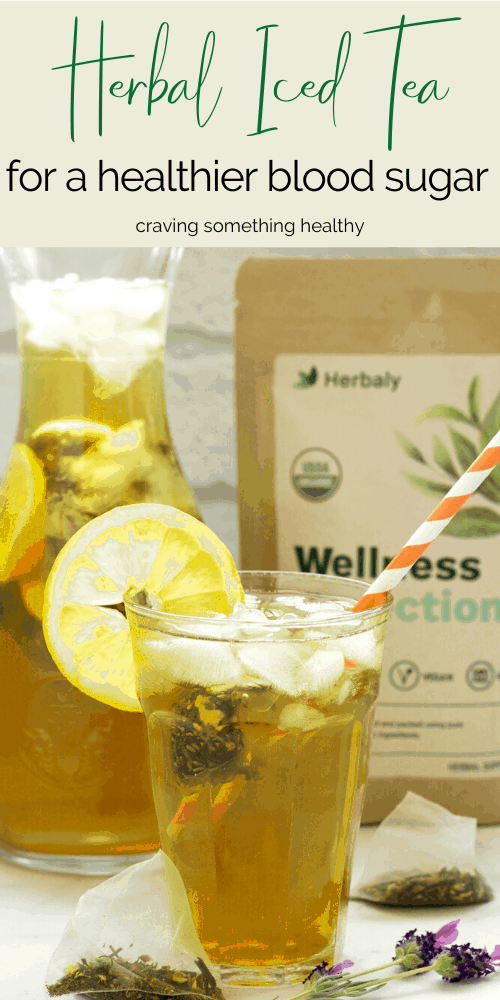How to Support Your Immune System When You Have Diabetes
This post is sponsored by Herbaly Tea. Some of the links in this post are affiliate links. That means I earn from qualifying purchases and no extra cost to you. Thanks for supporting this website! always, all opinions are my own. Thanks for supporting brands I use and love.
If you have diabetes, you may have noticed that your health care provider keeps a closer eye on your health. There’s a good reason for that. Diabetes affects your immune system, and your your immune system regulates your health and well-being. It’s like a military defense system that protects your body from foreign invaders.
Diabetes and Your Immune System
When your blood sugar is higher than it should be, that defense system starts to break down. One effect is increased inflammation throughout your body and especially in your blood vessels, which can lead to cardiovascular disease.
A weakened immune system also means you have an increased risk of contracting common infections like colds, flu, skin infections or pneumonia, and more serious ones like bone, joint, or heart infections. In fact, a study published in the journal Diabetes Care, found that people with diabetes are twice as likely to be hospitalized or die from a serious infection compared to those without diabetes. (1) That's an important reason to manage your blood sugar.
Normal Blood Sugar Values
The closer your blood sugar stays in the normal range throughout the day, the easier it is for your immune system to do its job. Here’s what to aim for:
- If you have prediabetes, try to keep your fasting sugar below 100 mg/dL, and your A1c below 5.7%. Those numbers are considered normal – no diabetes.
- If you have diabetes, the American Diabetes Association recommends working to keep your fasting or premeal blood sugar under 130 mg/dL, and your A1c under 7.0%.
- If you check your glucose during the day, you'll see that it goes up after you eat. That's called a postprandial glucose. Ideally, it shouldn't go over 140 mg/dL 2 hours after you eat. That's still considered normal.
Luckily, there are a few natural ways to improve your blood sugar and support your immune system at the same time. And hey, anything that kills two birds with one stone is good in my book!
Natural Ways to Support Your Immune System with Diabetes
Eat more low glycemic foods
Food with a low glycemic index won’t spike your blood sugar. Even though they contain carbs, they’re high in fiber, so they take longer to digest. Some of my favorite low glycemic foods also happen to be packed with vitamins and antioxidants that can support a healthy immune system. These include:
- All berries (strawberries, blackberries, blueberries, raspberries)
- Leafy green vegetables (spinach, kale, Swiss chard, arugula)
- Orange vegetables and fruits (carrots, sweet potatoes, cantaloupe, mango, peaches)
- Nuts and seeds (almonds, walnuts, pistachios, sunflower, pumpkin seeds)
- Legumes (kidney, black, or navy beans, lentils, chickpeas)
Lean proteins like chicken and fish actually score a big fat zero on the glycemic index scale. That means they have no carbohydrates, so they won’t raise your blood sugar. They also provide amino acids that your body needs to build the proteins in your immune system. Poultry, fish, and eggs are all great choices.
Drink Herbaly Wellness Collection tea each day
I recently discovered Herbaly Tea's Wellness Collection and it's like a secret wellness weapon – especially if you want to improve your blood sugar and support your immune system. I cold-brew a pitcher, keep it in my refrigerator, and sip it throughout the day.

It’s a tasty and refreshing organic herbal blend that’s formulated to support healthier blood sugar. The herbs and ingredients in Herbaly Wellness Collection tea may also strengthen your immune system and reduce inflammation. They include:
- Ginger which is rich in antioxidants, vitamins and minerals to naturally enhance the immune system. There’s research that shows some compounds in ginger have antibacterial properties.
- Fennel seeds which contain vitamin C and antioxidants. They also have antimicrobial properties.
- Dandelion root which can help fight inflammation. Some research on compounds in dandelion root suggests it can lower blood sugar levels. (2)
- Sencha a type of green tea which contains powerful antioxidant compounds called catechins. They’ve been shown to reduce inflammation, maintain insulin sensitivity and support healthy blood glucose levels. (3)
- Turmeric root, a source of curcumin. It’s the compound with a wide range of superpowers including anti-inflammatory and immune system supporting benefits. Research suggests it may both reduce inflammatory damage caused by high blood sugar and also help to lower glucose levels. (4)
Learn to manage your stress
We all have stress. However, some people can manage it better than others. Personally, I’m a Type-A, and I’ve had to work hard and learn ways to manage stress.
Chronic stress takes a toll on your immune system. It makes you more likely to contract a cold or flu, or even develop a chronic autoimmune disease. Stress also raises your cortisol levels, which in turn raises your blood sugar. It’s a major cause of high fasting blood sugars.
To manage stress, try any or all of these things:
- Yoga or tai chi
- Meditation
- Keep a gratitude journal
- Use adaptogenic herbs like Tulsi (also known as holy basil) or one of my favorites - Ashwagandha
Adaptogens are a class of herbs that help your body adapt to various types of stressors. They have long been used in Ayurvedic medicine. Tulsi is one of my favorites and it happens to be another ingredient in this tea. Tulsi been shown to enhance your immune system, reduce cortisol levels, and improve blood sugar. (5)

Aim for 7-9 hours of sleep each night
Sleep, especially deep sleep, is when your body and your immune system do their repair work. And even if you’re one who thinks you don’t need much sleep; the research shows otherwise. Almost all of us need an average of seven to nine hours of restorative sleep each night.
Sleep helps strengthen your immune system, lower stress hormones, improve your blood sugar, and it helps your brain to work better. If you have trouble getting to sleep, try taking some magnesium glycinate, a very low dose (0.5-3 mg) of melatonin, or a cup of Herbaly Wellness Collection tea in the evening. The tulsi and also lavender petals it contains can help relax you and may make it easier to fall asleep.

You can drink herbal tea hot, or cold brew it for a few hours like sun tea. I’m a fan of cold brewing because it doesn’t get bitter if you accidentally over steep it. Plus, it’s always hot where I live. Either way, you’ll enjoy the benefits. Here’s how I cold brew it.
Recipe

Healthier Blood Sugar Herbal Iced Tea
Ingredients
- 10 bags Herbaly Wellness Collection Tea
- 5 cups cold, filtered water
Instructions
- Place the tea bags in a large glass pitcher and pour the water over them. Cover the pitcher with a lid or plastic wrap and let it stand on your counter for at least 2 hours. If you prefer, you can refrigerate it for 6-12hours.
- Serve over ice with fresh fruit slices if desired. Keep the brewedtea in the refrigerator.
Nutrition
What have you been doing to strengthen your immune system? Stay well friends!
REFERENCES
1. Risk of infection in type 1 and type 2 diabetes compared with the general population: a matched cohort study: Diabetes care. https://care.diabetesjournals.org/content/41/3/513.long
2. The physiological effects of dandelion (Taraxacum Officinale) in type 2 diabetes. https://www.ncbi.nlm.nih.gov/pmc/articles/PMC5553762/
3. Hypoglycemic effect of soluble polysaccharide and catechins from green tea on inhibiting intestinal transport of glucose. https://www.ncbi.nlm.nih.gov/pubmed/32342987
4. Curcumin, an active component of turmeric (Curcuma longa), and its effects on health. https://www.ncbi.nlm.nih.gov/pubmed/26528921
5. Tulsi - Ocimum sanctum: A herb for all reasons. https://www.ncbi.nlm.nih.gov/pmc/articles/PMC4296439/


Good to have such an important teaching on issues thanks
You're so welcome! Thanks for reading!